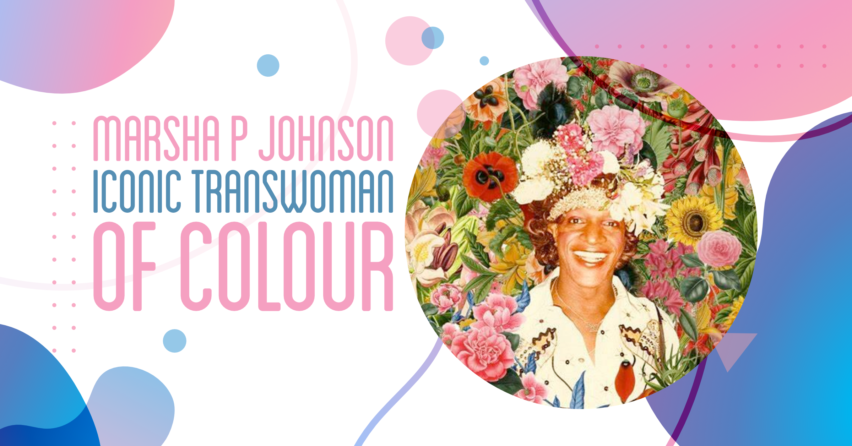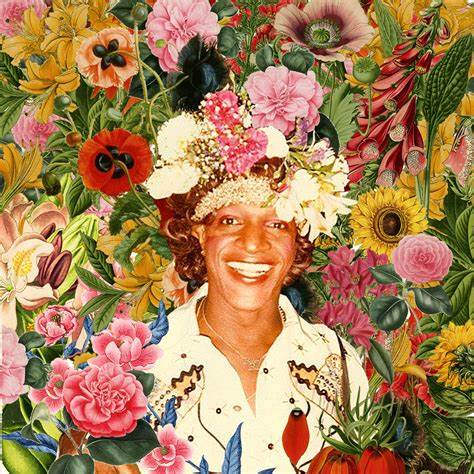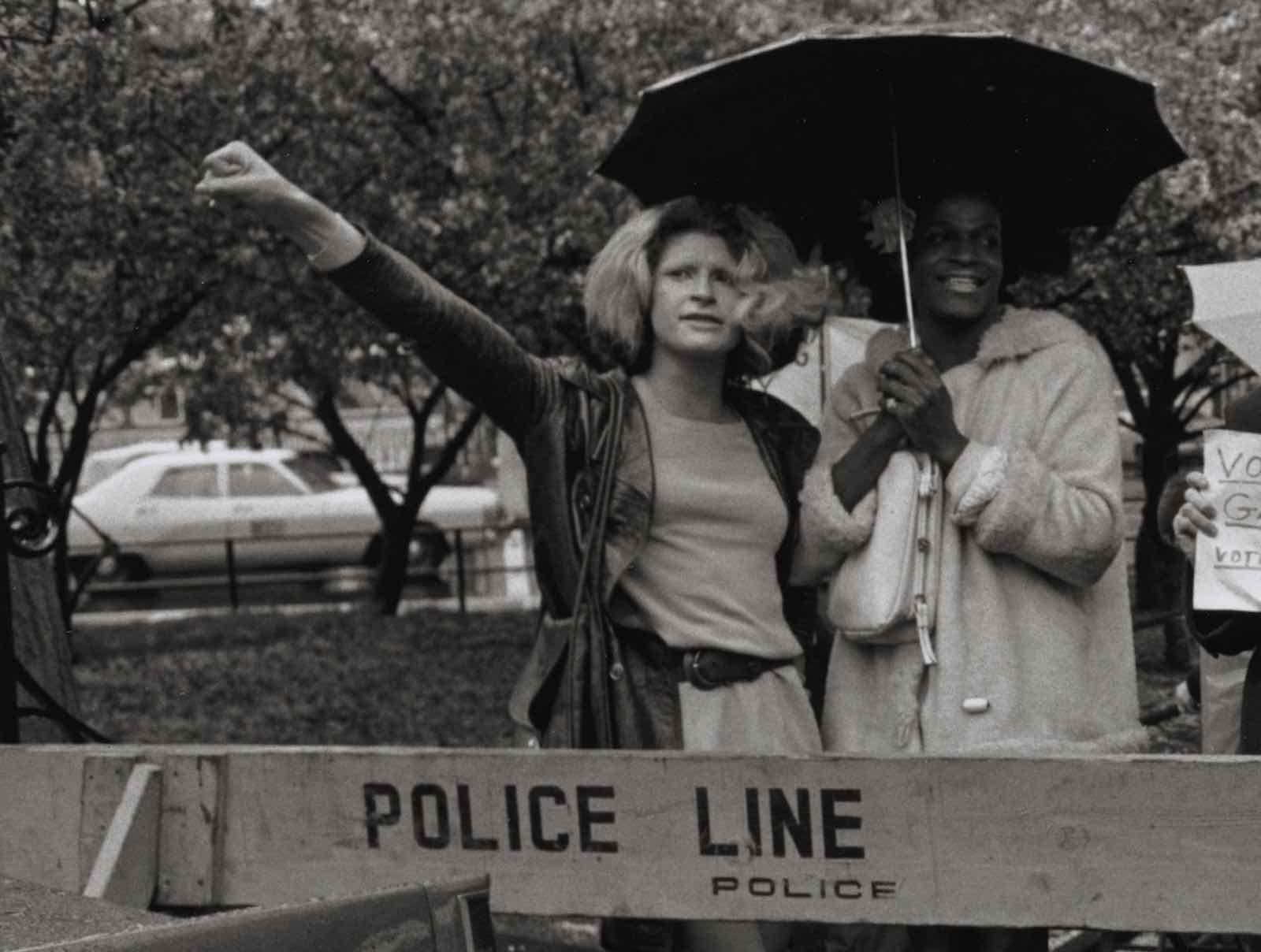Marsha P Johnson: Iconic Transwoman of Colour
by Siobhan Donegan
The colourful and flamboyant figure of Marsha P. Johnson was an iconic African-American Gay Liberation activist who self-identified as a drag queen. Despite the fact that during my research for this article I discovered some conflicting evidence for how Johnson specifically identified, as concerns her gender identity there is nevertheless a strong possibility that she was in fact a transgender woman, which is why I have decided to describe her as such in the title.
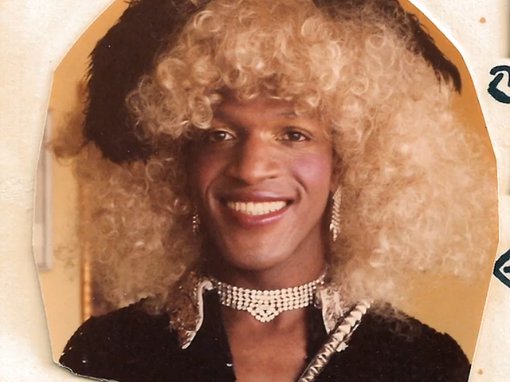 Marsha was born on the 24 August 1945 in Elizabeth, New Jersey. She had a strict Christian upbringing, attending Mount Teman African Episcopal Church, making for what has been described as a difficult childhood. After graduating from high school, she eventually moved to Greenwich Village in New York City, unfortunately at the time being very poor and homeless with apparently only fifteen dollars and a bag of clothes to her name. Desperate to survive Martha became a sex worker, which she claimed to have been arrested for over 100 times.
Marsha was born on the 24 August 1945 in Elizabeth, New Jersey. She had a strict Christian upbringing, attending Mount Teman African Episcopal Church, making for what has been described as a difficult childhood. After graduating from high school, she eventually moved to Greenwich Village in New York City, unfortunately at the time being very poor and homeless with apparently only fifteen dollars and a bag of clothes to her name. Desperate to survive Martha became a sex worker, which she claimed to have been arrested for over 100 times.
Regarding Marsha’s contribution to LGBT history, and in the wake of the global Black Lives Matter antiracism protest, the significance of Marsha P. Johnson is considerable. She is in fact famous for having been a pioneer figure-‘outspoken advocate’ of the early Gay Liberation Movement that actively sought to establish gay rights. As such she is regarded as a ‘prominent figure’, amongst others, of the Stonewall riots of 1969. However, Johnson despite having been credited with having inaugurated the riots has maintained that she wasn’t actually present at the very beginning of the uprising.
It is at this juncture that I would like to return to the subject of Marsha’s gender identity. Due to the obvious prejudice of the heteronormative culture in America during this era ‘Drag Queens’ and ‘Street Queens’ were also referred to as ‘Female impersonators’. Johnson was a flamboyant character who dressed ‘extravagantly’ and as such has been described as a ‘Drag Artist’. Furthermore, Marsha claimed that the ‘P’ in her name came about as a reaction to negative comments made by people about their appearance and life style-‘life choices’-and meant ‘Pay it no mind’.
According to one source of research I discovered, Johnson apparently never in fact self-identified with the specific term transgender, however this term wasn’t part of the cultural lingua franca at the time but the term transsexual was. Johnson actually identified in numerous ways such as gay, transvestite and as a Queen, which can obviously be understood as a ‘Drag Queen’ or ‘Street Queen’. Johnson’s gender identity or gender expression according to ‘Professor of Human Gender and Sexuality Studies’ Susan Stryker of the University of Arizona could best be described as ‘gender non-conforming’.
However, as previously mentioned, during my research I found conflicting evidence as regards Marsha’s specific gender identity. Thus in complete contra-distinction to the above, the most compelling evidence that she was in fact a transgender woman was that apparently she stated that she knew from a young age that she identified as female and despite being brought up in a strict family began to dress in female attire. Furthermore, according to friends she always referred to herself with She/Her pronouns.
Returning to the subject of the Stonewall ‘uprising’ I think we should briefly mention the general cultural climate of the time. As such, America during the late 1960’s was a very homophobic environment, with homosexuality being considered at the time a form of mental illness. Hence, perhaps it should come as no surprise that the gay community was often the victim of police brutality.
Marsha was only 23 years old in June 1969, when police raided the Stonewall Inn, a gay bar in New York City. Over 200 people were forced out of the bar and onto the streets by the police and then subjected to a violent attack that has been described as ‘excessive’.
Johnson, as already mentioned has been described as one of the ‘key figures’ who made a stand against the NYPD. She has also in fact become known as one of the ‘instigators’ and recognized as such-also as the ‘vanguard’ of the Gay Liberation Movement in the U.S.A-that the Stonewall uprising acted as a catalyst to inaugurate. At the time of the riots not only did Johnson resist arrest, but also in the aftermath organized a number of protest marches with the purpose of obtaining equal rights for gay people.
These events became an inspirational catalyst for a truly ‘pivotal moment’ in LGBT history. News of these protests had spread like wildfire around the world and inspired increasing numbers to join protest groups. Thus it was a mere month after the initial protests that the first openly gay march took place in New York.
Marsha however, is not only famous for these truly significant events. Hence if we return to the more personal biographical details of her life we can remind ourselves that when Marsha first arrived in New York she was very poor. Despite this Marsha found her true calling in the colourful, flamboyant life of a Drag Queen, becoming known for her outlandish hats and glamorous jewellery and becoming a well-known recognised figure in the ‘eccentric nightlife’ of Christopher Street. As regards this Marsha stated, ‘I was no one, nobody, from nowheresville until I became a Drag Queen’.
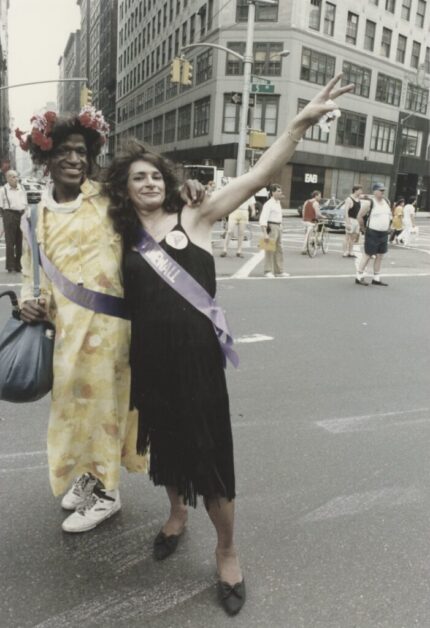 This new life also made Marsha so enthusiastic that it brought out her creative side, as she selected appropriate items from thrift shops and began designing her own costumes. From small beginnings Marsha became a rising star in the nightlife of Drag, eventually becoming a respected ‘Drag Mother’ to the up and coming youth looking to make a name for themselves on the drag scene. Marsha’s efforts eventually blossomed into a successful career when she ended up touring with the Drag Group ‘Hot Peaches’, who not only performed in London but in fact went on a global tour.
This new life also made Marsha so enthusiastic that it brought out her creative side, as she selected appropriate items from thrift shops and began designing her own costumes. From small beginnings Marsha became a rising star in the nightlife of Drag, eventually becoming a respected ‘Drag Mother’ to the up and coming youth looking to make a name for themselves on the drag scene. Marsha’s efforts eventually blossomed into a successful career when she ended up touring with the Drag Group ‘Hot Peaches’, who not only performed in London but in fact went on a global tour.
Returning to the depressing subject of the excessive police violence which was the catalyst that led to the Stonewall Uprising, I thought it was important to mention towards the end of the article that although it was a long time coming, an official apology was issued by the head of New York’s Police Department in 2019 stating, ‘The actions taken by the NYPD were wrong’.
Sadly, Marsha died tragically at only 46 in mysterious circumstances in 1992. She had been missing for six days when her body was found in the Hudson River. The initial ruling for the probable cause of death was suicide. However, Marsha’s close friends weren’t convinced claiming that Marsha hadn’t really shown any suicidal tendencies. Through years of constant demands to reopen the investigation, in 2012 the case was finally reopened, the verdict for her death being “undetermined”.
Despite the fact that Marsha P. Johnson has gone, her memory and legacy lives on in the shining example of the Marsha P. Johnson Institute, which states that it ‘protects the rights of Black Transgender people’.
